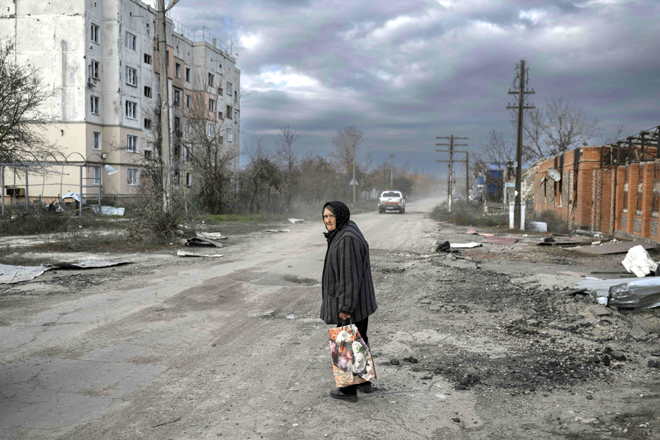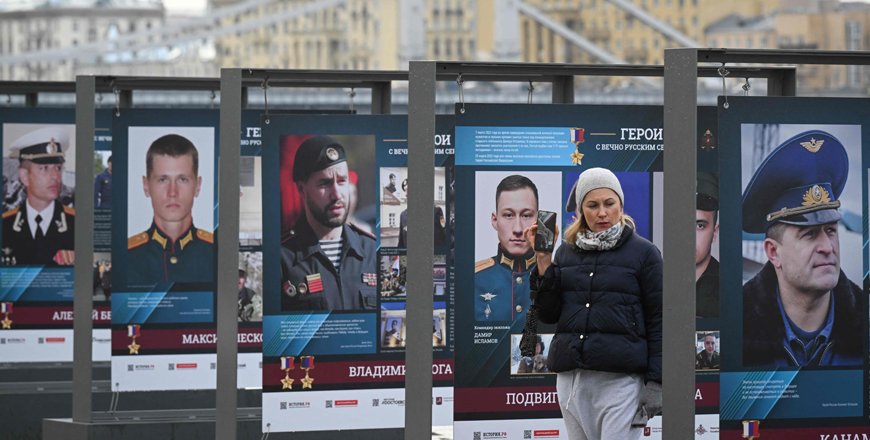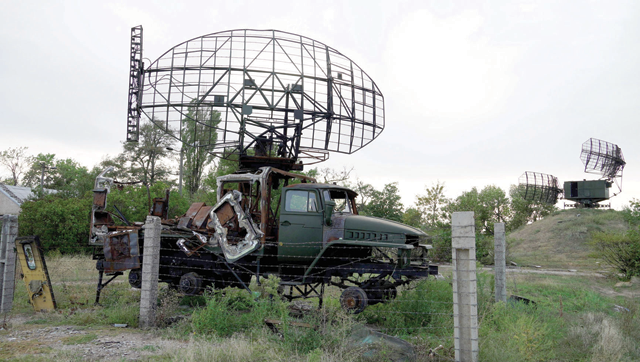You are here
Iran admits sending Russia drones but says before Ukraine war
By AFP - Nov 05,2022 - Last updated at Nov 05,2022

An old woman walks in the Kherson region village of Arkhanhelske on Thursday (AFP photo)
KYIV, Ukraine — Iran admitted for the first time on Saturday that it had sent drones to Russia but insisted they were supplied to its ally before Moscow's invasion of Ukraine.
Kyiv and its Western allies have accused Russia of using Iranian-made drones in recent weeks to carry out attacks in Ukraine.
Tehran has repeatedly denied the claims but on Saturday Foreign Minister Hossein Amir-Abdollahian was quoted as saying that drones had been sent to Russia before the invasion began in late February.
"We supplied Russia with a limited number of drones months before the war in Ukraine," the official news agency IRNA quoted Amir-Abdollahian as saying.
For weeks, Russian forces have rained missiles and explosive drones onto Ukraine infrastructure, as a major Ukrainian ground offensive — propelled by Western arms deliveries — has pushed Russian troops back in swathes of the country.
Russian strikes over the past month have destroyed around a third of Ukraine's power stations and the government has urged Ukrainians to conserve electricity as much as possible.
Ukraine's state energy company on Saturday announced additional power rationing in Kyiv and several other regions of the country.
"In a telephone conversation with the Ukrainian foreign minister last week, we agreed that if there was evidence [of Moscow's use of Iranian drones], he would provide it to us," Amir-Abdollahian said.
“If the Ukrainian side keeps its promise, we can discuss this issue in the coming days and we will take into account their evidence,” he added.
And he again denied Iran had supplied missiles to Russia, calling the accusations “completely false”.
In response Ukraine’s foreign ministry spokesman warned Iran Saturday in a post on Facebook that “the consequences of complicity” with Moscow would be “greater than the benefit from Russia’s support”.
‘Deportations’
Kyiv claims around 400 Iranian drones have already been used against the civilian population of Ukraine and that Moscow has ordered around 2,000.
Britain and the European Union have imposed sanctions on three Iranian generals and an arms firm accused of supplying Russia with drones.
Ukrainian and Russian forces appear to be gearing up for a fierce battle in Kherson, a southern city with a population of around 288,000 people before the conflict.
It was the first major Ukrainian city to fall to Russian forces after the Moscow invasion.
Russia has been pulling civilians out of the Kherson region, with President Vladimir Putin saying residents must be “removed” from danger zones.
But Kyiv has likened the departures to Soviet-style “deportations” of its people.
The Ukrainian presidency has accused the Russians of “trying to identify residents who refuse to be evacuated” to Moscow-occupied areas further away from the front line.
A judge in a Ukrainian town controlled by Moscow was in a “serious” condition after surviving an assassination attempt, a separatist leader in Donetsk said on Saturday.
‘Ready to fight’
Blaming Kyiv, the rebel leader of the self-proclaimed republic, Denis Pushilin, said on Telegram that the attack took place on Friday evening in the town of Vuhlehirsk, in the eastern Donetsk region.
Pushilin said the judge had been “giving sentences to Nazi war criminals”, referring to the terminology for Ukrainians used by the Kremlin to justify its invasion of Ukraine.
“His condition is assessed by doctors to be stable but serious,” Pushilin added.
Meanwhile, at a remote outpost in northern Ukraine, a border guard scanned the horizon to the border with Russia and Belarus just a few kilometres to the north.
“Our main objective is to prevent a [new] invasion. But if that happens again here, we’ll be ready to stop the enemy at the border and prevent them from coming in,” the 33-year-old told AFP, not giving his name.
Inside the well-fortified dugout that was set up after the Russian pullback in April, a border guard in his 30s who goes by the nickname “Lynx” says he thinks there’s a “50-50 chance” of a new Russian offensive.
“The likelihood of an attack will always be high here near the border, with a neighbour like that,” he says, a machine gun slung over his shoulder.
But some 30 kilometres to the south in Gorodnia — the first town occupied by the Russians on the first morning of the invasion — Mayor Andriy Bogdan told AFP the situation “is completely different” from what it was back then when his town was “almost completely unprotected”.
“We are relying on our border guards and all our defence forces. Today they are here and ready to fight,” Bogdan says.
Related Articles
KYIV — Russian President Vladimir Putin on Wednesday declared martial law in four regions of Ukraine recently annexed by Moscow as his proxy
KHARKIV, Ukraine — Russia said it was pulling back troops from the eastern Kharkiv region of Ukraine as Kyiv announced massive territorial g
KYIV — Ukraine said on Thursday it had recaptured swathes of fresh territory from Russian troops as Kyiv urged Europe to help its forces exp














